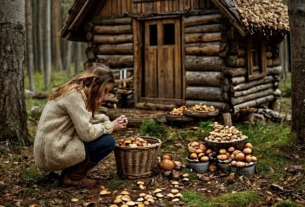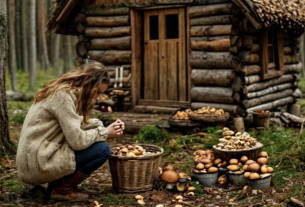In that little town, tucked away at the edge of geography like the last speck of dust on the map, time flowed not by the clock, but by the seasons. It froze in harsh winters, thawed with the slush of spring, drowsed in the scorching summer heat, and mourned with the damp rains of autumn. And in this slow, heavy current, the life of Lyudmila—whom everyone simply called Lyusya—was drowning.
Lyusya was thirty years old, and her whole life seemed hopelessly bogged down in the swamp of her own body. She weighed one hundred and twenty kilos, and it wasn’t just weight—it was a whole fortress, erected between her and the world. A fortress of flesh, fatigue, and quiet despair. She suspected the root of the problem was somewhere inside—a defect, a disease, a metabolic disorder—but traveling to specialists in the regional center was unthinkable: far away, humiliatingly expensive, and seemingly pointless.
She worked as a nanny in the municipal kindergarten Kolokolchik (“The Little Bell”). Her days were filled with the smell of baby powder, boiled porridge, and perpetually wet floors. Her large, incredibly kind hands could soothe a crying toddler, swiftly make a dozen beds, and wipe up a puddle without making a child feel guilty. The children adored her, drawn to her softness and calm affection. But the quiet delight in the eyes of three-year-olds was poor compensation for the loneliness that awaited her beyond the kindergarten gates.
She lived in an old, eight-apartment barracks building left over from some “glorious” Soviet past. The house was on its last breath, creaking in its beams at night and trembling at every strong gust of wind. Two years earlier, her mother had passed away for good—a quiet, worn-out woman who had buried all her dreams within the walls of the same Khrushchev-era flat. Lyusya remembered nothing of her father; he had long since vanished from their lives, leaving behind only a dusty emptiness and a faded photograph.
Her daily life was harsh. Cold water rattled from the tap in rusty trickles, the only toilet was outside—like an icy cave in winter—and the rooms sweltered in summer heat. But the worst tyrant of all was the stove. In winter, it devoured two full truckloads of firewood, draining the last drops of her meager salary. Lyusya would spend long evenings staring at the fire behind the cast-iron door, and it seemed to her that the stove was consuming not only the logs, but also her years, her strength, her future—reducing it all to cold ashes.
And then one evening, when the gathering twilight filled her room with gray despondency, a miracle happened. Not loud or grand, but quiet and worn, like the slippers of her neighbor, Nadezhda, who suddenly knocked on her door.
Nadezhda, a cleaning lady at the local hospital, her face furrowed with lines of care, held two crisp banknotes in her hand.
“Lyus, forgive me, for God’s sake. Here—two thousand. They weren’t crying about it, forgive me,” she muttered, shoving the money into Lyusya’s hand.
Lyusya only stared at the money in surprise—the debt she had long written off as lost two years ago.
“Come on, Nadya, you shouldn’t have worried.”
“I should!” the neighbor interrupted heatedly. “I’ve got money now! Listen to this…”
Lowering her voice, as though sharing a state secret, she told an incredible story. About how a group of Tajiks had come to their town. How one of them, approaching her as she swept the street, offered her strange, frightening work—fifteen thousand rubles.
“They need citizenship, see? So they come to places like ours, looking for brides. Fake ones, for marriage. Yesterday they registered me. Don’t know how they work it out at the registry office, probably slip them some cash, but it’s all quick. Mine, Ravshan, he’s at my place now ‘for show,’ but he’ll leave after dark. My daughter Sveta agreed too—wants a new winter coat. And you? Look at the chance! Do you need money? You do. And who else will marry you?”
The last words were not said in malice, but with the bitter bluntness of everyday truth. And as the familiar pain pierced her heart, Lyusya thought only for a second. Her neighbor was right. Real marriage wasn’t in her future. Suitors didn’t exist—couldn’t exist. Her world was limited to the kindergarten, the shop, and this room with its voracious stove. But here—money. Fifteen thousand. Enough to buy firewood, to finally put up new wallpaper and chase away the gloom of those faded, torn walls.
“All right,” Lyusya said quietly. “I agree.”
The next day Nadezhda brought the “candidate.” When Lyusya opened the door, she gasped and instinctively retreated into the hallway, wanting to hide her massive figure. Before her stood a young man—tall, slender, with a face still untouched by life’s harshness, and large, dark, incredibly sorrowful eyes.
“My God, he’s just a boy!” escaped Lyusya’s lips.
The young man straightened.
“I’m already twenty-two,” he said clearly, with barely a trace of accent, only a soft, melodious undertone.
“Well then,” Nadezhda bustled in, “mine’s fifteen years younger, and yours is only eight. A man in his prime!”
But at the registry office, they refused to register the marriage immediately. A stern official measured them with a suspicious gaze and announced that the law required a one-month waiting period. “To think it over,” she added meaningfully.
The Tajiks, their business part done, left to work. But before going, the young man—his name was Rakhmat—asked for Lyusya’s phone number.
“It’s lonely in a strange city,” he explained, and in his eyes Lyusya recognized a feeling she knew well—lostness.
He began to call. Every evening. At first the calls were short, awkward. Then longer. Rakhmat turned out to be a remarkable conversationalist. He spoke of his mountains, of the sun that was so different there, of the mother he adored, of how he came to Russia to help his large family. He asked Lyusya about her life, about her work with children, and to her surprise, she told him—really told him, not complaining. About funny moments at the kindergarten, about her home, about the wonderful smell of the first spring earth. She caught herself laughing into the receiver—clear and girlish, forgetting her weight and her years. In that month, they learned more about each other than some spouses do in years.
A month later Rakhmat returned. As Lyusya put on her only festive silver dress, tight around her figure, she felt not fear, but nervous excitement. The witnesses were his countrymen, the same lean, serious young men. The ceremony was quick and emotionless for the officials. But for Lyusya, it was a flash: the gleam of wedding rings, the official words, the surreal sense of it all.
Afterward, Rakhmat walked her home. Entering the familiar room, he solemnly handed her the envelope with the promised money. Lyusya took it, feeling a strange heaviness in her hand—the weight of her decision, her despair, her new role. Then Rakhmat pulled a small velvet box from his pocket. Inside, on black velvet, lay a delicate gold chain.
“This is a gift for you,” he said quietly. “I wanted to buy a ring, but didn’t know the size. I… I don’t want to leave. I want you to be my real wife.”
Lyusya froze, unable to say a word.
“In this month I heard your soul over the phone,” he continued, his eyes burning with a serious, mature fire. “It’s kind and pure, like my mother’s. She died. She was my father’s second wife, and he loved her very much. I love you, Lyudmila. Truly. Let me stay. With you.”
This wasn’t a request for a fake marriage. It was a proposal. And as Lyusya looked into his honest, sorrowful eyes, she saw not pity, but what she had long ago stopped even dreaming of—respect, gratitude, and a budding tenderness.
The next day Rakhmat left, but now it wasn’t parting—it was the beginning of waiting. He worked in the capital with his fellow countrymen, but came to her every weekend. And when Lyusya found out she was expecting a child, Rakhmat took a new step: he sold part of his share in their joint business, bought a used Gazelle van, and returned to the town for good. He started a transport business, carrying people and goods to the district center. Thanks to his diligence and honesty, the business quickly prospered.
Then a son was born. And three years later—another. Two handsome, dark-skinned boys with their father’s eyes and their mother’s gentle, smiling nature. Their home filled with laughter, cries, the patter of little feet, and the smell of true family life.
Her husband didn’t drink, didn’t smoke—his religion forbade it. He was incredibly hardworking and looked at Lyusya with such love that the neighbors glanced at her with envious spite. The eight-year age gap dissolved in that love, became invisible.
But the most amazing transformation happened to Lyusya herself. It was as if she had blossomed from within. Pregnancy, a happy marriage, the need to care not only for herself but for her family—all this made her body change. The excess weight began to melt away day by day, as if it had only been a protective shell for something delicate and fragile, waiting for its time. She didn’t diet—her life simply filled with movement, care, and joy. She grew more beautiful, a sparkle appeared in her eyes, and her stride gained a springy confidence.
Sometimes, standing by the stove—now neatly stoked by Rakhmat—Lyusya would watch her sons playing on the rug and feel the warm, adoring gaze of her husband on her. And she thought of that strange evening, of the two thousand rubles, of her neighbor Nadezhda, and of how the greatest miracle often comes not in flashes of lightning, but in a knock at the door—bringing with it a stranger with sorrowful eyes, who once gave her not a sham marriage, but a whole new life. A real one.



